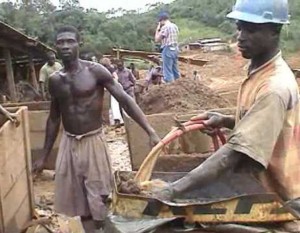World Bank increases financial support to deal with impacts of artisanal mining, logging in Ghana to $49m
 The impacts of artisanal mining and logging in Ghana are well documented. They include among others deforestation, soil quality degradation, water pollution and pose threats to food security when not properly managed. Logging and mining are also known to lead to conflict in some communities.
The impacts of artisanal mining and logging in Ghana are well documented. They include among others deforestation, soil quality degradation, water pollution and pose threats to food security when not properly managed. Logging and mining are also known to lead to conflict in some communities.
The World Bank is therefore providing funding to the country to address the impacts of these activities.
In a press release copied to ghanabusinessnews.com, the Bank said its Board of Executives Directors has approved additional financing of $19.39 million for the country.
“It is based on two tranches of a grant and loan of $9.89 million for Artisanal Small-scale Gold Mining (ASGM) in Forest Landscapes and $9.50 million to build private sector engagement in plantation activities in the Brong-Ahafo, Ashanti, Eastern and Western regions of Ghana,” the release said.
The Bank in February 2015 approved an amount of $29.5 million for the project and it is expected to close in June 2020. This latest round of financing brings the total to $49 million.
Asferachew Abate Abebe, the World Bank Task Team Leader of the Forest Investment Programme was quoted as saying: “Community members engaged in Artisanal Small-Scale Mining, including women, will gain access to new skills and economic opportunities through rehabilitation activities at inactive mining sites, including opportunities created by tree planting and plantation establishment.”
The Bank notes that the Ghana Forest Investment Programme is already implementing activities focusing on agricultural drivers of deforestation by working with cocoa farmers and communities to rehabilitate and protect forest reserves.
“The additional financing operation aims at complementing these activities by piloting approaches to and benefits of reclamation of mining sites, which will reduce erosion currently polluting public water courses and engage the private sector in plantation development to reduce pressure on natural forests and to meet the construction, housing and furniture needs of Ghana’s growing economy,” it said.
It states that under the original project, women have significantly engaged and benefitted from project activities, particularly in enrichment planting and plant nurseries.
“This will continue and be further enhanced under this additional financing operation. Plantation establishment in nearby areas will further help to create jobs for community members, contribute to knowledge sharing and uptake, increase awareness of sustainable forestry management practices, and increase opportunities for promoting positive private sector contributions to Ghana’s overall REDD+ effort,” the Bank said.
It indicates further that the proposed activities will contribute to reducing pressure on high biodiversity areas.
It notes also that through replication and scaling up of lessons from pilot sites, communities, landowners, farmers and cocoa growers could gain through reduced impact of mining activities on production systems, as well as improvement of their local environment, adding that other stakeholders, including the private sector and civil society, will benefit through improved stewardship of land. The implementing agencies charged with forest, landscape and mining management, will also benefit from clarified policies and guidance, capacity development programs, and outreach programmes.
“This operation also aligns with the Ghana Sustainable Growth Development Agenda (GSGDA-II, 2014-2017), which seeks to achieve socio-economic transformation to create a significant number of quality jobs to raise average incomes,” the release said.
Commenting, Henry Kerali, the World Bank Country Director for Ghana, Liberia and Sierra Leone, said; “The additional financing operation is fully consistent with the World Bank Group’s goals to end extreme poverty and to promote shared prosperity with environmental, social, and fiscal sustainability. It is also aligned with the recent Systematic Country Diagnostic which prioritized the need for taking immediate measures, including implementing the ‘Cocoa Forest Mosaic Landscape’ and control and mitigation of artisanal mining, to stop deforestation and degradation.”
By Emmanuel K. Dogbevi
Copyright ©2019 by Creative Imaginations Publicity
All rights reserved. This article or any portion thereof may not be reproduced or used in any manner whatsoever without the express written permission of the publisher except for the use of brief quotations in reviews.
